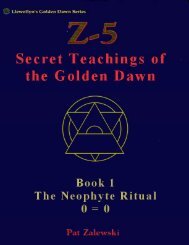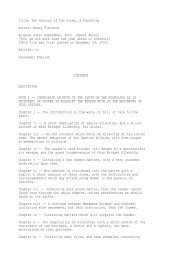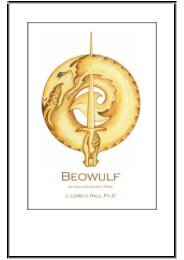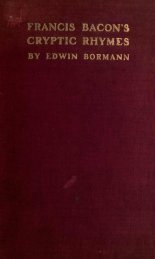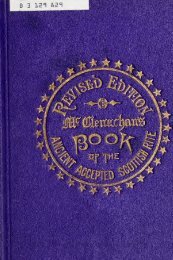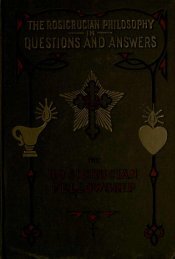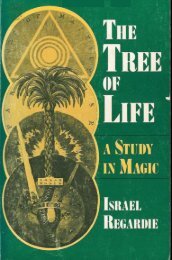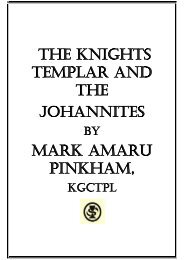Click to download PDF version: 3.87MB - Global Grey
Click to download PDF version: 3.87MB - Global Grey
Click to download PDF version: 3.87MB - Global Grey
You also want an ePaper? Increase the reach of your titles
YUMPU automatically turns print PDFs into web optimized ePapers that Google loves.
80 At the Back of the Black Man's Mind By R. E. Dennett<br />
(4) MANIA-MATALI, generally the name of a district up a river where rocky land rises<br />
from the low-lying swamps.<br />
MANIA means the "cold" s<strong>to</strong>nes found in rivers and valleys. The word written in full is<br />
MANDIA (the princely womb). Ideas of the moon are connected with this word;<br />
everything looks cold by moonlight, and is actually cold.<br />
MATALI (or Matadi) means the metallic rocks, heated by the sun, NTANGUA (mother<br />
chaser), and is opposed <strong>to</strong> NGONDE (or NGONDIA) the Moon, regarded here as the<br />
mother of the sun. The words mania-matali stand also for sun and moon.<br />
The Sun and Moon are also spoken of as two brothers running one after the other, but as<br />
the word NKOMBA in BAVILI may stand for either brother or sister, we may if we like<br />
call them brother and sister.<br />
The sun and moon are further spoken of as judges <strong>to</strong> whom certain palavers must be<br />
referred. The other day I noticed a very neatly devised badge (Pl. IIb) upon a native's<br />
shirt, and I asked him what it meant. The background of the badge was red, a favourite<br />
colour with the materialistic Bavili. The sun and new moon were figured in white cloth,<br />
while the mouth was formed of white and black cloth. The native <strong>to</strong>ld me that he had a<br />
palaver with a certain cook, and that they had come <strong>to</strong> the conclusion that the decision<br />
of so great a question could come only from the sun and moon. Upon a visit <strong>to</strong> the grave<br />
of my old native friend Francisco I found the following device upon the gate of the fence<br />
surrounding it: the sun with lines across its face and the moon in its last quarter. Here<br />
no mouth was figured, showing, I suppose, that all breath was at an end. I can find no<br />
trees sacred either <strong>to</strong> the sun or moon.<br />
5. The Morning Star the Bavili liken <strong>to</strong> a child running before its parent calling him <strong>to</strong><br />
rule the day. This Star they call MA ULA. 46<br />
The Evening Star is the offspring expressing its joy at going <strong>to</strong> rest with its mother the<br />
Moon, and it is called NXIENJI.<br />
The full moon rises from her couch accompanied by this same star, her offspring, now<br />
her husband, and this star is then called NDONGO (the spirit of witchcraft).<br />
6. NKONDA or NONGA-NZAU (<strong>to</strong> hunt the Elephant) has the meaning of amassing<br />
everything for one's own family and giving nothing <strong>to</strong> others. It is the name of certain<br />
<strong>to</strong>wns The words symbolise weight, energy, and plenty.<br />
7. BULU-NTU (a breaking of the head) a place generally situated about the falls of a river<br />
where the waters burst a channel through or past the rocks. MBULU = beast. NTU =<br />
man.<br />
46 The exclamation U ULU is that with which the Bavili greet either the new moon or a "witch" (NDOXI)<br />
www.globalgrey.co.uk



